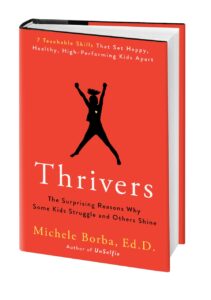Michele Borba, author, Thrivers, The Surprising Reasons Why Some Kids Struggle and Others Shine: Interview by Melissa Couch Salim
 Michele Borba has been a teacher, educational consultant and parent for many years, and she has never been more worried about kids than she is right now. She describes our kids today as strivers—educated, motivated and more privileged than ever before, yet depressed, lonely and empty, and this is according to hundreds of interviews she has done with kids throughout the country. I had the opportunity to read her book—THRIVERS—and present her with questions. This book is a MUST READ for any parent!
Michele Borba has been a teacher, educational consultant and parent for many years, and she has never been more worried about kids than she is right now. She describes our kids today as strivers—educated, motivated and more privileged than ever before, yet depressed, lonely and empty, and this is according to hundreds of interviews she has done with kids throughout the country. I had the opportunity to read her book—THRIVERS—and present her with questions. This book is a MUST READ for any parent!
Can you describe todays’ typical “Striver” and what is preventing them from being today’s “Thriver”?
A “thriver” is a kid who has a sense of agency and skills of reslience. So, when he’s faced with a challenge he is more likely to say, “I’ve got this” and not rely on adults for rescue. The result is that he’s more likely to bounce back and succeed. Strivers are kids who want to succeed but when faced with challenges rarely go the full 9 yards and overcome. The biggest reason is that that lack the skills of resilience that could help them do so. Reasons that prevent them from becoming a Thriver are many. We have done too much for our kids – call it helicoptering or overparenting – so they don’t learn to develop inner confidence and learn to rely on themselves. We believe that GPAs and test scores are the best success guarantee but now realize that those measures help kids in school but not always in life. And we also fail to realize that resilience is made up of skills-like problem solving, calming down, social skills, growth mindsets, recognizing emotions-but because we lack an updated parenting tool kit on how to teach them we don’t instill them in our children. The goal of Thrivers is to give parents simple, evidence-based set of skills that we can help our children learn and so they will be more likely to thrive – not striver.
You write about the 7 Essential character strengths kids must have to succeed. Empathy, Curiosity, Optimism, Self Confidence, Self-Control, Perseverance and Integrity. What are ways we can teach these early in a child’s life?
The good news is that resilience skills are teachable and easy to weave into our everyday family interactions with our children. A few ideas:
- Acknowledge your child’s strengths and interests/ We’re far more likely to focus on our children’s weaknesses, but strengths build confidence. Identify a few legitimate strengths that you want your child to recognize about himself and then acknowledge them. Be specific so you child knows exactly what he did to deserve recognition. “You’re patient: you always wait until it’s your turn.” You’re artistic: your color combinations and details that you put into your drawings are stellar!” Or let your child overhear your praise by affirming her strength to someone without knowing that you want her to. “Wait until you hear Kisha’s piano playing! You’ll be so impressed with her musical ability!”
- Provide ongoing caring opportunities–whether it’s helping a sibling, raking leaves for a homebound neighbor, or collecting blankets to give to the shelter. Children’s empathic concern increases with recurrent opportunities and soon they begin to see themselves as caring people who are making a difference in the world!
- Use open-ended toys, gadgets and games. Creative kids thrive on experiences where they can let their imaginations go wild and don’t have to worry about “right” answers.” Such opportunities also help kids believe in their creative abilities and keep their curiosity vibrant. And an openness to ideas and possibilities is a key trait that helps children thrive.
- Kids can develop negative, harmful “I can’t” or “I’ll never get it right” mind-sets. When you hear “can’t, never, won’t comments, respond with a grow mind-set phrase that helps your child that that with effort, he will improve. Child” “I can’t do it.” Parent” “No, you can’t do it ‘yet’!”
- Ungrounded pessimistic thinking erodes optimism, sets kids up for failure, and shortchanges their thriving abilities. So create a private code like, pulling on your ear or touching your elbow, that only you and you kid understand. The code means she’s said a negative comment. Then encourage her to take a Reality Check. Child: “I never get good grades.” Parent: “Reality Check!” What about your math scores?”
 In the book you write: “Integrity plus Curiosity plus Empathy enhance purpose and can start a social movement”. That’s a powerful statement. Can you expand on this?
In the book you write: “Integrity plus Curiosity plus Empathy enhance purpose and can start a social movement”. That’s a powerful statement. Can you expand on this?
I knew parents would want to know which Character Strength is the most important. I had the same question, and while researching Thrivers I discovered the answer. Each Character Strength improves a child’s thriving potential (as well as academic performance), but is always more powerful when combined with another strength because they create a Multiplier Effect. In fact, one reason Thrivers are more adept at navigating life is because they use several strengths together. So Empathy + Curiosity helps find common ground and be open to ideas. Integrity gives kids a moral rudder, so when they see something that isn’t right and goes against their moral compass it fuels their purpose to do something to right the wrong. Add Empathy and Curiosity to Integrity and you have an unstoppable kid who feels deeply about the issue and is driven to do something about it. Those are kids who become our changemakers.
Why is Empathy among today’s kids and teens on a fast decline?
Children are hard-wired to care but unless we nurture their human potential, empathy can lie dormant. And reasons why empathy among today’s kids and teens is on a fast decline are many. Empathy increases with face to face connection so digital devices can reduce those up-close, personal moments. Competition is a verified empathy reducer and our children are growing up in a society driven by high stakes testing that pits kid against kids. Research says we empathize “What did you get?” (the grades or scores) far more than “What kind thing did you do today?” And we jumped on the self-esteem bandwagon in the belief that our kids must constantly know that they’re special, loved and oh so valued, and so we praise them and give out those trophies for just about everything. The research now shows that doing so increases self-absorption and reduces empathy.
Why are parents so focused on education, ambition and success for their kids? At what point did we as parents get off track?
Over the past two decades we’ve been fed the idea that grades and scores are the holy grail for success. Of course, we love our children dearly and want them to be happy and successful and so we bought into that we should stress our children’s cognitive abilities. So we put all our efforts into fine tuning our children’s intellectual growth in the belief that doing so would secure their future. But our efforts backfired. Our children are less happy and more stressed, lonely, depressed and suicidal when compared with any previous generation – and those descriptions were identified prior to COVID-19 and all the resulting anxiety it produced.
Sure, GPA can help get kids into college. But we’re finding the kids who are happier, healthier and more successful later on in life are kids who have developed a different skill set – a thriver set – and that’s what is going to keep them going. It isn’t that grades don’t matter, but they’re not the only thing that matters. We need to broaden our parenting so we empathize character strengths (and the skills that helps kids thrive) and learning success.
I’ve read articles that state the first few years make or break a child’s odds for success. What do you say to this?
Don’t buy into it! There is also extraordinary research on children who overcome severe adversity from young ages. It is never too late to help a child – or grown-up become more resilient. The more we recognize that thrivers are made, not born the greater our chance of raising children who can bounce back from challenges and live meaningful, productive lives in an uncertain new world.
You discuss recognizing ore assets to help guide kids towards their purpose. How can parents recognize our little one’s assets early on?
Begin by letting your little one experience different activities. Doing so can help you identify what they care about as well as help you see what gives them joy. Those are big clues into recognizing who they are and will serve as your guide to building their identity. Expand your child’s horizons by encouraging new interests or start family hobbies – art, music, woodwork, baking. Involve relatives: Aunt Sally can teach guitar, Uncle Fred can offer woodworking lessons, Grandma can do cooking lessons via zoom. Thrivers often use hobbies to decompress. Ordinary things can make extraordinary differences in our children’s abilities to thrive.
For parents with teens struggling to find a sense of self, is it ever too late to discuss and teach the importance of character strengths?
The best news about resilience is that it is never too late to begin teaching and discussing the importance of character strengths. That said, we also have to be a bit more creative in our teaching strategies and one way is to realize how important peers are to teens. My suggestion: partner with liked-minded parents who want to raise thrivers. Then find ways for teens to do service projects together that interest them.
Do you offer consultations for both kids and parents, and how can interested families reach you?
Thank you for asking. I’ve worked with over one millions parents, schools and organizations on raising resilient kids. I also zoom with book clubs – any interested group of 12 or more folks who are reading Thrivers. My website is www.micheleborba.com and you can find me on Twitter @micheleborba.
Tags: adolescence, having a family, melissa couch salim, michele borba, promoting success in kids, raising kids, teaching resilience, thrivers















